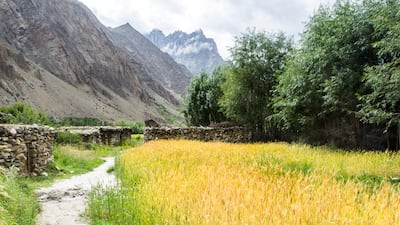Authorities in Pakistan have arrested 17 suspects in connection with an attack on a bus in which nine people were killed and another 16 injured in the Gilgit-Baltistan region.
Unidentified gunmen opened fire at a passenger bus in the Chilas area of Diamer district at about 6.30pm on Saturday, causing it to collide with a lorry.
Two army personnel and one member of the police force were among the dead.
The bus was travelling from the Ghizer area of the mountainous northern region to the federal capital Islamabad.
Deputy inspector general of police in Diamer, Farrukh Rasheed, said 17 people had been arrested in search operations launched after the shooting.
“At the moment, it is premature to declare any breakthrough but the probe is ongoing and hopefully we will get some clue soon,” he told The National.
“We have beefed up security in the entire Chilas area, where the number of checkpoints has been increased, with stricter checking at the entry and exit points. Also, it is strictly ensured that vehicles move in the form of a convoy being escorted by security personnel.”
There was no immediate claim of responsibility for the attack. The Pakistani Taliban, which has stepped up militant attacks since late last year, on Sunday denied involvement in the shooting.
Residents of Chilas staged a protest on Monday to demand the identification and arrest of the attackers.
“This is not the first time a shooting has happened in Chilas – the area has witnessed frequent incidents,” said Faizullah Firaq, a community elder and a former spokesman for the regional government. "Now we want the authorities to bring the culprits to justice.
“Locals are peaceful and hospitable people and the area is also a tourist spot. We want to put an end to such incidents so that tourists come here,” he told The National.
Sher Ghazi, a resident of Gilgit-Baltistan who works for a non-government organisation based in Islamabad, told The National his brother was killed in a shooting in Chilas in 2012.
Mr Ghazi, who commutes frequently between Gilgit-Baltistan and Islamabad, said it was rare for culprits to be identified and arrested in the event of such shootings in the Chilas area.
“On November 5, I travelled from GB to Islamabad, spending 22 hours during the commute that normally takes 12 hours, because we had to stop and move in the form of a convoy as part of security measures. However, the shooting took place because travel in the form of convoys had been halted in recent days.”
The convoy system was introduced in August after a rise in sectarian tension in the region, which is home to three sects – Sunnis, Shiites and Ismailis. Sunni clerics called for protests in response to comments by a Shiite cleric, resulting in the blockade of roads by Sunnis in Chilas and the Kohistan area of neighbouring Khyber Pakhtunkhwa. Authorities ordered buses to travel in convoys, escorted by security personnel, from Gilgit through Chilas and up to Kohistan.
The convoy system was halted 10 days ago, according to Fida Hussain, co-ordinator of the GB Action Committee, a human rights organisation.
“Had the convoy system been in place, the attack may not have happened,” he said.
“It was strange that attackers carried out such an attack in the Chilas area as the population is small and all residents know each other. How did the local authorities fail to prevent this?”
Mr Rasheed, meanwhile, said the use of convoys was halted because authorities believed the situation had returned to normal.
“Even if a convoy was moving at time, the attack would have caused more casualties," the police officer said.
There is no conspiracy in this. We are trying our level best to ensure security.”
The Gilgit-Baltistan government announced compensation of one million rupees ($3,542) for the families of those killed, 500,000 rupees for those seriously injured and 300,000 rupees for people who suffered minor injuries, said Eman Shah, an adviser to the regional administration.
The region is governed by Pakistan as an administrative territory, with its elected legislative assembly enjoying fewer powers than those in the four fully fledged provinces of Khyber Pakhtunkhwa, Punjab, Sindh and Balochistan. It is also an area disputed by India and Pakistan.
New Delhi last month voiced concern over a visit there in September by US ambassador to Pakistan, Donald Blome.

